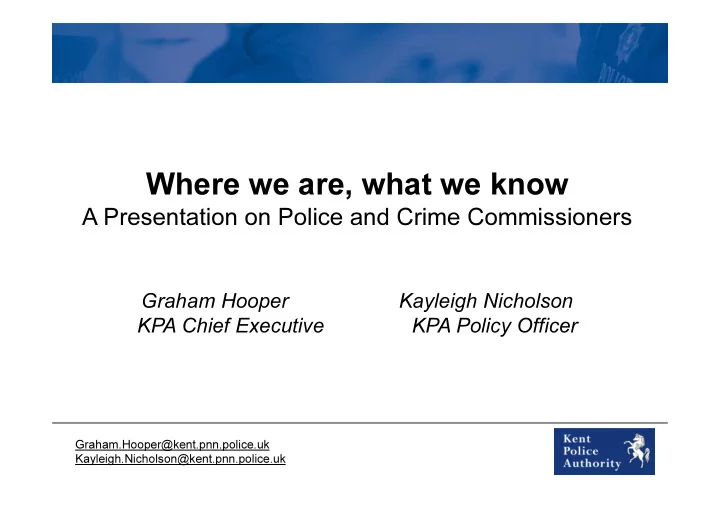

Where we are, what we know A Presentation on Police and Crime Commissioners Graham Hooper Kayleigh Nicholson KPA Chief Executive KPA Policy Officer Graham.Hooper@kent.pnn.police.uk Kayleigh.Nicholson@kent.pnn.police.uk
Police and Crime Commissioners – Why? The government’s philosophical underpinning of PCCs revolves around: 1. A desire to significantly strengthen police accountability, increasing its visibility. 2. That ‘new’ accountability should be local and largely free from central (Whitehall) controls. 3. That the present local accountability arrangements (i.e. police authorities) are ‘not sufficiently connected to the public’.
Police and Crime Commissioners – Why? Out (according to the government) goes bureaucratic control of the police – in comes democratic accountability. New commissioners will be ‘ big local figures with a mandate to drive the fight against crime and anti-social behaviour ’. PCCs will determine: • The policing strategy for an area • The force budget • Set the local tax precept (police element) • Appoint - and if necessary dismiss - the chief constable
PCCs – The Timetable PCCs will be introduced in November 2012 for a four-year term. They will be salaried. Kent PCC post - £85k (proposed). Elections will take place on 15 November 2012. A 7 day period will then elapse in which the PCC- designate will prepare to take office. Police Authorities will hand over to PCCs at 00.01 on 22 November. All staff will be transferred to the PCC who will determine the arrangements for his/her support.
PCCs – The Timetable PCC arrangements will apply to every police force in England & Wales save for the Met (the Mayor will act), British Transport Police and the City of London. PCCs have to produce a five-year Police and Crime Plan but this will address wider issues than just the police role in tackling crime. PCCs have a duty to co-operate with the broader Criminal Justice System – but are not a Responsible Authority on a Community Safety Partnership.
PCCs & Police and Crime Panels PCCs will be obliged to consult and engage with the public, just as police authorities currently do. PCCs will be scrutinised by Police & Crime Panel (PCP) Police & Crime Panels are intended as a check and balance to the new PCC, although the panels will not have direct control over a commissioner’s decisions. Police and Crime Panels will scrutinise the actions of the Commissioner and not those of the force.
Establishing Police and Crime Panels Panel Membership: Panels will include a councillor representative from each of the LAs in the force area. For Kent this will mean 14 councillor Members: 1x KCC 1x Medway Unitary 12x District representative The panel is also required to recruit a minimum of two co-opted Independent Members. (A total Membership of 16) PCPs may also choose to recruit further members up to a maximum membership of 20. Kent’s PCP can therefore co-opt a further 4 Members if it so wishes. The Panel will hold the PCC to account by�.
PCCs & Police and Crime Panels Holding to Account • Requiring the PCC to attend public hearing to respond to concerns • Reviewing the PCC’s draft Police & Crime Plan and make recommendations • Review PCC expenditure proposals and make recommendations • Require information in the possession of the Commissioner • Deal with complaints about the conduct of the Commissioner A Panel will have the right to veto (with 2/3 majority): - the precept/budget - the chief constable appointment
Item 6 - Establishing Police and Crime Panels Panel Arrangements: One local authority in the force area will host the panel – to be decided by agreement locally This local authority will receive £30k funding pa, largely to fund a Scrutiny Officer Panel members receive a £920 member grant
Police and Crime Commissioners - Community Safety Commissioners will have the following powers and duties relating to community safety: Reciprocal duty for Commissioners and responsible authorities to co-operate with each other for the purposes 1 of reducing crime and disorder Power to bring a representative of any of all CSPs in their 2 area together to discuss priority issues Power to require reports from CSPs about issues of 3 concern Power to approve mergers of CSPs on application of the 4 CSPs concerned Power to commission community safety work from a 5 range of local partners including, but not limited to, CSPs
PCCs – Some things to ponder • General relationship with the force/chief? Public/private conversations? • PCC sensitivity to operational events (especially those with significant impact on police/public relations)? • Differing requirements for accountability/oversight • Electoral mandate – the PCCs ‘promises to the people’? • Commissioning policing services from private sources – look out!
PCCs – Some things to ponder • PCC and the Police & Crime Panel. A new dynamic. • PCC and localism (v the national) • PCCs take over the world! The expansion of PCCs into criminal justice territory • Confused electorate – will think they have voted for their chief constable By the way��the PCC may be ok!
PCCs - is this the Future?
Contact Details Graham Hooper – Chief Executive Graham.Hooper@kent.pnn.police.uk 01622 604488 Kayleigh Nicholson – Policy Officer Kayleigh.Nicholson@kent.pnn.police.uk 01622 604480
Recommend
More recommend